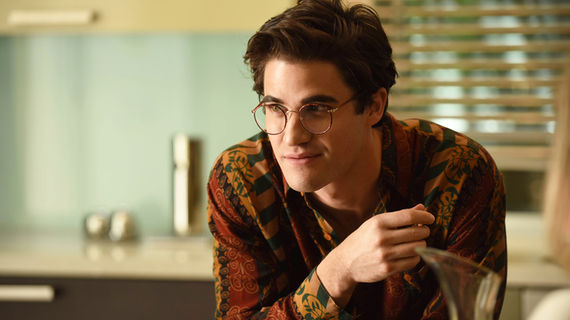All Mindhunter images courtesy Netflix
Some light spoilers for Mindhunter and American Crime Story: The Assassination of Gianni Versace to follow, along with a content warning for extreme violence.Open Thread is where Waypoint staff talk about games and other things we find interesting. This is where you'll see us chat about games, music, movies, TV, and even sports, and welcome you to participate in the discussion.This past weekend, I binge-watched Mindhunter, Netflix’ new, dramatized-but-based-on-true-events series about the origin of the FBI’s Behavioral Sciences Unit. It’s set in the 70s, when profiling serial killers was just beginning to be a thing and despite thinking the main character had about as much charisma as stale break (it’s ok, the show does, too), I could not get enough.“One more episode,” was the refrain. “C’mon.” And then, of course, we’d watch another, with protagonist Holden Ford finding a way to create rapport with serial killer Edmund Kemper. Agent Tench, the cop-ass-cop of the duo, starting to see value in it. Dr. Carr—a professor and consultant on the project— finding ways to reign in these two and actually make their research viable and scientific and therefore useful in predicting violent behavior.Eventually finishing up in spectacularly dramatic fashion, we were both shocked to realize that it was over. Season one: finished.We immediately rolled into season two of American Crime Story: The Assassination of Gianni Versace. This is another dramatized but based-on-true-events story of a serial killer, the stylish, compulsive-lying Andrew Cunanan, who killed a whole bunch of people on a spree that included famed fashion designer Gianni Versace at his Miami Beach palace in 1997. He preyed especially on gay men, using his good looks and erudite air to get men to trust him. Then, he robbed or killed them. Sometimes both.Where Mindhunter is sometimes clinical, showing its characters meticulously interviewing serial killers in scenes that almost border the mundane, this show is passionate. It delves deeply into Cunanan’s victims’ lives, and cares deeply about their interior selves: struggles, passions, heartbreak.I’m halfway through the season so far, but I already “know” Versace to some degree. I know Lee Miglan, a successful but closeted elderly man who, in one scene, tearfully prays at an alter, telling Jesus he “tried” not to be gay. I know David, a young man who dated Andrew and took him in, only to watch him brutally murder another friend, then hold him hostage and eventually kill him, too. I know about David’s relationship to his dad, an outdoorsman who wasn’t exactly pro-gay, but loved his son enough to accept him, despite his own leanings.Both are valid approaches to the genre, as is the ridiculous, sexy Hannibal, which didn’t so much humanize a serial killer and cannibal, but made him so hot that it was impossible to resist his allure.God, it all just makes me want to watch Hannibal again.But all of this has got me thinking: why, exactly, is the serial killer genre so popular in our culture? Why is it so compelling to watch other human beings be broken down, terrified, brutally murdered? Why do we want to understand why that happens? What drives this morbid fascination with a particular psychological extreme?I don’t really have any answers. If I had to wager a guess, I imagine that it’s fun on some level to play armchair detective, and comforting on a deeper level to have a safe (fictionalized) space to contend with the dark side of human nature.Do you have any theories, dear reader? Let us know in the comments!
He preyed especially on gay men, using his good looks and erudite air to get men to trust him. Then, he robbed or killed them. Sometimes both.Where Mindhunter is sometimes clinical, showing its characters meticulously interviewing serial killers in scenes that almost border the mundane, this show is passionate. It delves deeply into Cunanan’s victims’ lives, and cares deeply about their interior selves: struggles, passions, heartbreak.I’m halfway through the season so far, but I already “know” Versace to some degree. I know Lee Miglan, a successful but closeted elderly man who, in one scene, tearfully prays at an alter, telling Jesus he “tried” not to be gay. I know David, a young man who dated Andrew and took him in, only to watch him brutally murder another friend, then hold him hostage and eventually kill him, too. I know about David’s relationship to his dad, an outdoorsman who wasn’t exactly pro-gay, but loved his son enough to accept him, despite his own leanings.Both are valid approaches to the genre, as is the ridiculous, sexy Hannibal, which didn’t so much humanize a serial killer and cannibal, but made him so hot that it was impossible to resist his allure.God, it all just makes me want to watch Hannibal again.But all of this has got me thinking: why, exactly, is the serial killer genre so popular in our culture? Why is it so compelling to watch other human beings be broken down, terrified, brutally murdered? Why do we want to understand why that happens? What drives this morbid fascination with a particular psychological extreme?I don’t really have any answers. If I had to wager a guess, I imagine that it’s fun on some level to play armchair detective, and comforting on a deeper level to have a safe (fictionalized) space to contend with the dark side of human nature.Do you have any theories, dear reader? Let us know in the comments!
Advertisement

Advertisement